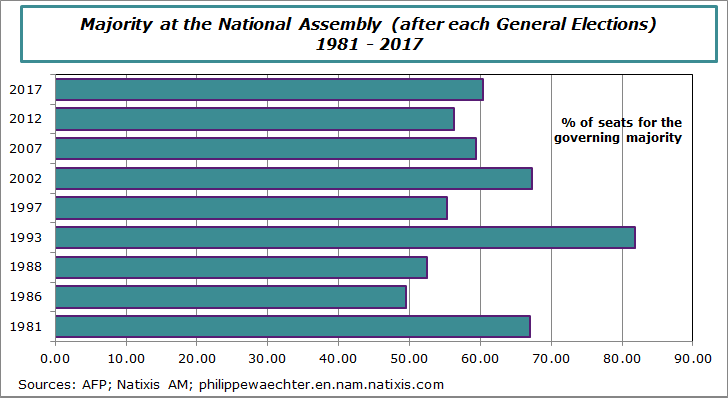The President-elect has won an overall majority after the general elections. His party will have 306 seats and 348 when the Modem, a close political party, is included (on 577 seats). Nevertheless, the new majority will not depend on ally (Modem).
It’s far from the tsunami that was expected after the first round. The new President majority will represent 60% of the seats (versus almost 80% expected after the first round) it is close to the average seen since 1981.
The next step will be the confidence vote on the new government. It will be done on July the 4th. It will be interesting as some members of the conservative party (Les Républicains) could vote with the majority. In that case the conservatives could split.
The other aspect is to know who will be the leader of the opposition. Will it be Les Republicains with their 136 seats, the highest number outside the majority? The leader could also be Jean Luc Melenchon a former candidate at the presidential election (far left) or Marine Le Pen the runner up (far right) of this presidential election.
The large majority will give a democratic legitimacy to the President elect and his government.
It ill be important in coming weeks as the government will discuss the labor market reforms that were announced by Emmanuel Macron during his campaign. With this overall majority the balance of strength is in his favor.
Trade Unions will fight on these reforms as they will lose power with them. Negotiations on the labor market (hours worked, wages, …) will now be discussed at the company or at the branch level and no longer at the global level.
For the government companies are too different in their behavior and in their constraints to have the same law. Macron said that there was no “one size fits all” on the labor market. But these reforms will weaken Trade Unions. The negotiation will be harsh and the government has an advantage with this democratic legitimacy.
Nevertheless the very low turnout at the second round of these general elections is a source of weakness for the government. In coming days and weeks, each of them, government and trade unions, will do their best to show their strength to influence the way the negotiations will go. Melenchon has announced demonstrations.
This is important as it is only the first step. In coming months, the government wants to discuss the unemployment benefit framework. It is currently managed by Trade Unions (employers and employees) but the government wants to manage it by itself. It will also be the source of a weaker position for Trade Unions.
For the government it will important to well start the negotiations in order to keep its credibility high.
The governeùment capacity to change the labor market behavior will condition the way Germany and Angela Merkel will take into account France in the European institutional reforms. We perceive in discussions between Macron and Merkel that France has committed to deep reforms and must realize them in order to take part at the discussion on institutional reforms.
The first step for Emmanuel Macron was to win the Presidential election, then to have a strong majority at the National Assembly. The third step is the labor market reform and the fourth, on Europe, will depend on the realization of the third step.
The stake here is a deep change in the French social model. That’s why it was important for President Macron to have this overall majority.

Philippe Waechter's blog My french blog


